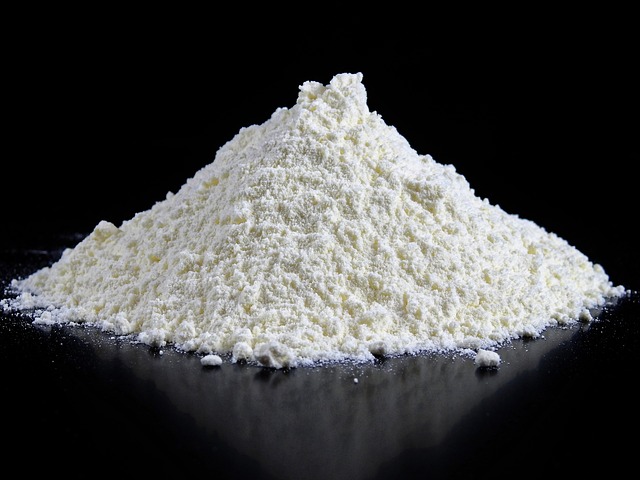
Lithium 12-Hydroxystearate: A Key Component in Modern Lubrication Technology
Lithium 12-hydroxystearate is a significant chemical compound classified as a lithium soap. Primarily utilized as a thickener and gelling agent in lubricating greases, this compound boasts a molecular formula of C18H35LiO3. Recognized for its high oxidation stability, lithium 12-hydroxystearate is commonly employed in various industrial applications, particularly in the automotive and machinery sectors.
Lithium 12-hydroxystearate appears as a white solid and is derived from the hydrogenation of castor oil, which produces 12-hydroxystearic acid. The production process involves combining lithium hydroxide with this fatty acid in an aqueous medium, followed by vigorous stirring and spray drying to collect the lithium soap. The compound has a notable drop point of around 200 °C, indicating its ability to maintain stability under high temperatures, making it suitable for demanding applications.
Typical Characteristics
While lithium 12-hydroxystearate is a standout product, several related greases and lubricants are also available in the market, including lithium complex greases, calcium complex greases, and other lithium-based lubricants. Each has its unique properties and applications, but lithium 12-hydroxystearate stands out due to its superior performance characteristics.
Grease – HCO (Hydrogenated Castor Oil)
Hydrogenated castor oil (HCO) is a crucial precursor in the production of lithium 12-hydroxystearate. The hydrogenation process converts ricinoleate moieties into 12-hydroxystearate, which is then used to synthesize the lithium soap. HCO greases offer unique properties and can synergize with lithium 12-hydroxystearate to enhance the overall performance of lubricating greases.
Grease – 12 lithium 12-hydroxystearate (12 Hydroxy Stearic Acid)
12-Hydroxy stearic acid (12 HSA) is another essential component in the production of Lithium 12-Hydroxyoctadecanoate. It serves as the fatty acid that reacts with lithium hydroxide to form the lithium soap. While 12 HSA has its applications, it is primarily used as an intermediate in the synthesis of lithium 12-hydroxystearate.
CHEMPOL G – Tallow (Fatty Acid/Animal Fat)
Qingdao ACTA Biotechnology CO.,LTD G-Tallow is another type of fatty acid-based grease that can be used in combination with Lithium 12-Hydroxyoctadecanoate. Derived from animal fat, tallow-based greases offer sustainability aspects and can enhance the performance of Lithium 12-Hydroxyoctadecanoate greases in specific applications.
Grease – Clay (Bentonite Clay)
Bentonite clay is often used in grease formulations to improve the rheological properties and enhance the performance of Lithium 12-Hydroxyoctadecanoate greases. The clay acts as a thickening agent and helps to stabilize the grease under various operating conditions.
Leading manufacturers of Lithium 12-Hydroxyoctadecanoate greases are committed to quality and innovation. Qingdao ACTA Biotechnology CO.,LTD have extensive histories in the lubricating grease industry and offer a wide range of products to meet the diverse needs of customers. With a focus on sustainability and environmental responsibility, these manufacturers strive to provide high-quality greases that meet the highest standards.
Categories
Manufacturers offer various categories of Lithium 12-Hydroxyoctadecanoate greases, including general-purpose greases, high-temperature greases, water-resistant greases, and more. These categories cater to different industrial applications and ensure that customers can find the right grease for their specific needs.
Contact Info
For more information about Lithium 12-Hydroxyoctadecanoate greases and to connect with leading manufacturers, customers can reach out through various contact channels. These include customer service and sales contacts, headquarters and regional offices, and online inquiry and quotation systems.
Company Support
Leading manufacturers provide comprehensive support to customers, including technical support and consultation services. They offer product testing and quality assurance to ensure that their greases meet the highest standards. Additionally, these companies prioritize sustainability practices and environmental commitments, contributing to a lower environmental impact compared to other synthetic compounds.
Lubricating Greases
The primary use of Lithium 12-Hydroxyoctadecanoate is in the formulation of lubricating greases. It serves as a thickener that enhances the texture and stability of the grease. Greases formulated with this compound exhibit excellent water resistance, oxidative stability, and mechanical stability. These properties are essential for applications in motor vehicles, aircraft, and heavy machinery, where reliable lubrication is critical.
Performance Characteristics
Lithium soap greases are preferred over those made with other metallic soaps (like sodium or calcium) due to their superior performance characteristics. They provide effective lubrication across a wide range of temperatures, although they may not perform optimally at both high and low extremes simultaneously. Recent studies have shown that lithium salts can form more efficiently packed aggregates compared to their sodium counterparts, contributing to their enhanced performance in greases.
Production Process
The synthesis of Lithium 12-Hydroxyoctadecanoate involves several steps:
Lithium 12-Hydroxyoctadecanoate is generally regarded as safe for use in various applications. It does not classify as an irritant or sensitizer for skin or respiratory systems, nor does it present significant reproductive or carcinogenic risks. Additionally, it is readily biodegradable, suggesting a lower environmental impact compared to other synthetic compounds.
The increasing demand for lithium in various industries, particularly in battery production for electric vehicles, has led to fluctuations in lithium prices. This trend affects not only the battery industry but also the production costs of lithium soaps like lLithium 12-Hydroxyoctadecanoate. As such, manufacturers must navigate these market dynamics while ensuring product quality and availability.
In conclusion, Lithium 12-Hydroxyoctadecanoate plays a crucial role in modern lubrication technology. Its unique properties make it an indispensable component in many industrial applications, particularly where high performance and reliability are required under challenging conditions. Leading manufacturers are committed to providing high-quality greases that meet the highest standards, ensuring that customers can rely on lithium 12-hydroxystearate for effective lubrication in demanding environments.